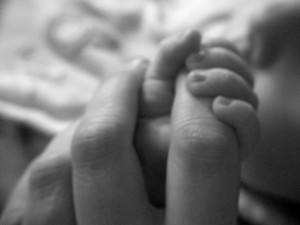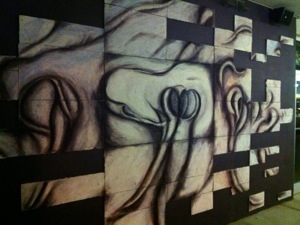Lightning Crashes
 “The Doctor wants you in Room 9… right now!”
“The Doctor wants you in Room 9… right now!”
We could hear the urgency in the nurse’s voice as my fellow student colleagues and I walked through the door onto the labor and delivery floor, back from our 1-hour lunch break. We hurried to Room 9 to see what was going on, and when I entered, I immediately knew that I was about to see something I’ve never seen before in my life.
“Any minute now,” the doctor said as he was putting on his protective gown. “We’re going to welcome a baby into the world today!”
Upon my attending’s request, I ran over to help hold our patient’s leg, as she strained in pain to push what she had been carrying for the past 9 months. “Breathe! Good. I can see his hair now!”
Several pushes went by and the baby was not coming out fast enough. Without further hesitation, the doctor knew what he had to do, and made a vertical perineal incision to widen the outlet, and after another strenuous push, a head appeared, then soon after, a shoulder, as the doctor gently guided the baby out through the right cardinal directions. A river of fluid accompanied him on his way out, and at that moment chills went down my back. I had just witnessed the birth of a new baby. A few seconds after he came out, he gave his first cry, and it was relieving to hear it. The doctor wiped the baby down with a towel and handed him briefly to the mother. For the first time, the mother and her son meet. “Incredible” she whispered with joy, with tears still in her eyes. I felt deeply touched. All I could see was pure love during that special moment between the new mother and her child, and it was as if nothing else mattered outside of that. Soon, reality hit again, and we had some stitching and cleaning up to do, and the placenta still needed to come out. The nurse took the baby to the side of the room to further prep him. But all the while the doctor and nurse were busy finishing up their jobs, the mother continued looking back at her son, with a smile that nobody could take away.
Seeing a birth for the first time really changed me. I’ve always had a lot of respect for women, but this experience made me deeply appreciate women and what women have to go through even more so. It’s something us guys would never experience, and it made me think about my own wife, and what she may have to go through in the future when we have our first child. It was incredible seeing a new individual who did not exist before, suddenly exist, and I was deeply moved by the unconditional connection between the mother and her child. Despite the painful, harsh, and seemingly chaotic process of childbirth, seeing the love that was there in that room that day made me realize how beautiful it really was.
It had only been my second day in my OB/Gyn rotation when I saw a natural birth. OB/Gyn was something that never really interested me all that much in the past, but with these past few days, I realized that the field of OB/Gyn is a whole different world by itself, so different from any other rotation I’ve done in the past, and I’m amazed at how interesting it is. I am going to love this rotation.
“lightning crashes, a new mother cries
this moment she’s been waiting for
the angel opens her eyes
pale blue colored iris,
presents the circle
and puts the glory out to hide”
– Live














nice piece. gives me motivation to work harder in my premed classes.
Thanks David. Best of luck in your studies!
Hi! i am also a med student but not n the U.S.A but in Taiwan.
i am so touched after reading this article. =)
Actually,i’ve read some pieces you wrote about your life as a med student,and i think it’s so different here in Taiwan.
May i ask you that What motivates you the most to make you want to be a doctor?
Thanks for visiting my site Tiffany and good luck in medical school in Taiwan! I think what I enjoy most about medicine is the mission of helping people, no matter who they are, or whether or not you like them. Seeing people get better, or at least seeing them learn to cope with their issues, makes me happy. While our current health care system (and to a certain extent, our culture) is far from being able to provide care for everyone “no matter who they are,” it’s my personal ideal to live by.